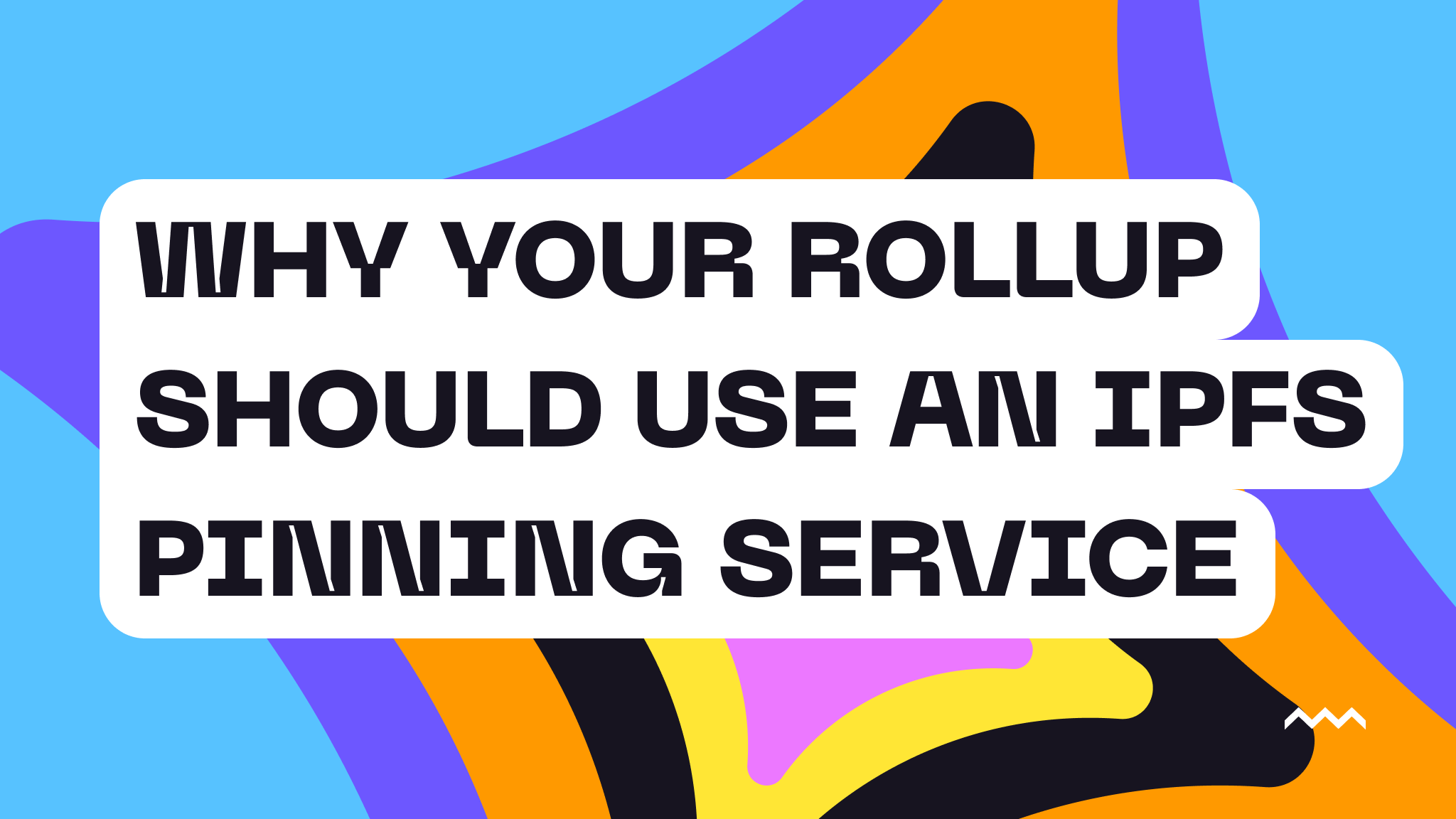Back to blog

Why Your Rollup Should Use an IPFS Pinning Service: A Developer's Guide
Rollups are Layer 2 (L2) scaling solutions that execute transactions off the Ethereum mainnet (Layer 1) while posting transaction data on L1. They significantly improve Ethereum's scalability by:
- Processing transactions off-chain in batches
- Posting compressed transaction data and validity proofs to Ethereum
- Inheriting Ethereum's security while reducing costs
There are two main types of rollups:
- Optimistic Rollups: Assume transactions are valid by default and use fraud proofs to challenge invalid transactions
- ZK Rollups: Use zero-knowledge proofs to mathematically verify transaction validity
Why Rollups Matter:
- They can increase Ethereum's transaction throughput from ~15 TPS to thousands of TPS
- They reduce transaction costs by 10-100x while maintaining security
- They enable new use cases by making blockchain transactions more accessible and affordable
The Data Availability Challenge
When building a rollup, you're faced with a fundamental challenge: you need to make transaction data permanently available for security and verifiability, but storing everything on Ethereum L1 is prohibitively expensive. This is where IPFS comes in.
But there's a catch.
Why Doing It Yourself Is Hard
Many rollup developers consider running their own IPFS nodes or relying on the public IPFS network. Here's why this approach is risky:
- Unreliable Data Persistence: Improper configuration of IPFS nodes can result in data loss. Without quality pinning infrastructure, your critical transaction data might disappear.
- Network Performance: Public IPFS gateways can be slow or unreliable, affecting your rollup's user experience.
- No Service Guarantees: When users need to verify historical transactions, you can't guarantee data availability.
Using an IPFS Pinning Service
A pinning service solves these problems by:
- Guaranteeing Data Persistence: Your data stays available as long as you need it
- Providing Fast Access: Enterprise-grade infrastructure ensures quick data retrieval
- Offering SLAs: Clear uptime and availability guarantees (on enterprise contracts)
- Simplifying Operations: No need to manage IPFS infrastructure
Implementation Guide
Here's how to integrate a pinning service into your rollup:
1. Choose a Pinning Service
- Look for services with good uptime guarantees (Pinata’s uptime is greater than 99.999%)
- Consider geographic distribution
- Check pricing models - you'll need to store a lot of data
2. Integration Pattern
async function publishBatch(transactions) {
// Pack your transaction data
const batchData = encodeBatchData(transactions);
const cid = await pinata.upload.json(batchData); // Upload to IPFS via Pinata
await rollupContract.submitBatch(cid); // Submit the CID to L1
}
3. Monitoring and Maintenance
- Set up alerts for pinning failures
- Monitor storage usage and costs
- Implement retention policies for old data
Cost Analysis
Let's break down the economics:
- L1 storage: ~20,000 gas per batch hash (~$1)
- IPFS pinning: ~$0.05/GB/month
- Full L1 data storage: ~500,000 gas per batch (~$25)
For a rollup processing 1000 transactions per day:
- Annual L1 hash storage: ~$365
- Annual IPFS storage (with pinning, depending on total data stored): ~$1200
- Savings: Over 90% compared to full L1 storage
Best Practices
1. Retention Policies
- Define how long to retain historical data
- Implement automated cleanup of old data
2. Monitoring
- Track data availability
- Monitor retrieval times
- Set up alerts for failures
Conclusion
A reliable IPFS pinning service is not just an optional addition - it's a critical infrastructure component for any production rollup. The combination of cost savings, reliability, and simplified operations makes it a clear choice for serious rollup developers.
Ready to implement? Here are some next steps:
- Sign up for a free Pinata account
- Set up a test integration
- Implement monitoring and alerting
- Plan your data retention strategy
Your users trust your rollup with their transactions. Make sure that trust is well-placed with reliable data availability through professional IPFS pinning services. Sign up for Pinata today!

